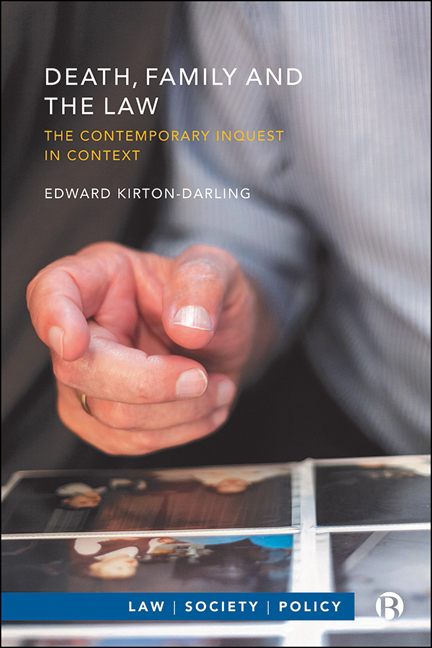Book contents
- Frontmatter
- Contents
- Acknowledgements
- Series Editor’s Preface
- 1 Death, Family and the Law
- 2 Accountability and Authority in the Historical Jurisdiction
- 3 Accountability Reconceived
- 4 First Contact and the Next of Kin
- 5 Dignity, the Family and the Body
- 6 Family in the Driving Seat
- 7 The Public(?) Hearing
- 8 Reimagining the Inquest
- Bibliography
- Index
2 - Accountability and Authority in the Historical Jurisdiction
Published online by Cambridge University Press: 08 October 2022
- Frontmatter
- Contents
- Acknowledgements
- Series Editor’s Preface
- 1 Death, Family and the Law
- 2 Accountability and Authority in the Historical Jurisdiction
- 3 Accountability Reconceived
- 4 First Contact and the Next of Kin
- 5 Dignity, the Family and the Body
- 6 Family in the Driving Seat
- 7 The Public(?) Hearing
- 8 Reimagining the Inquest
- Bibliography
- Index
Summary
Introduction
History – and in particular a sense of the inquest as a venerable feature of English justice – plays a vital role in the contemporary jurisdiction. This history buttresses – and, I argue, can potentially disrupt – a system often represented as brought up to date for modern needs, focused on fact finding, aided by expert medical knowledge and tweaked to tie in human rights concerns: flexible, pragmatic and local. In this chapter, I examine that history, focusing in particular on the relations of the community, the jury, the Coroner and the family in the historical jurisdiction. My suggestion is that the role of the community, and the authority of the jury in particular, made possible a form of community accountability for death. Furthermore, it was the notification and the participation of that community which established the law of the inquest. By contrast, family and kinship is harder to find in the historical record. Where it does become clear is in the device of the deodand and, in particular, in the moment of abolition of the deodand.
For centuries in England and Wales, at the end of in an inquest into a death, the jury could declare an animal or inanimate object to be responsible for the death. Such an object was named deodand, a gift to God, and was forfeit to the sovereign, but could be used as a means of compensating bereaved kin. The deodand was abolished in 1846 and was replaced with the first Fatal Accidents Act, allowing bereaved family members to claim compensation following death.
That moment of abolition simultaneously illustrates a slowly diminishing role of the community and jury, and the rising importance of the family. This means that analysis of the deodand enables reflections on the ways in which the construction of accountability shifted, and the way in which family began to emerge as a key part of the inquest process.
This chapter opens with analysis of some of the unique aspects of the contemporary jurisdiction, including the role of history, before moving to examine the historical inquest and, in particular, to reflect on accountability and authority in that historical jurisdiction.
- Type
- Chapter
- Information
- Death, Family and the LawThe Contemporary Inquest in Context, pp. 25 - 48Publisher: Bristol University PressPrint publication year: 2022



